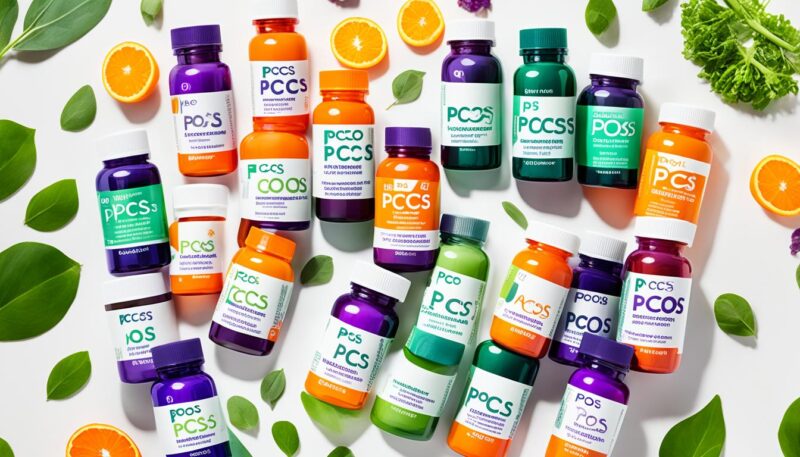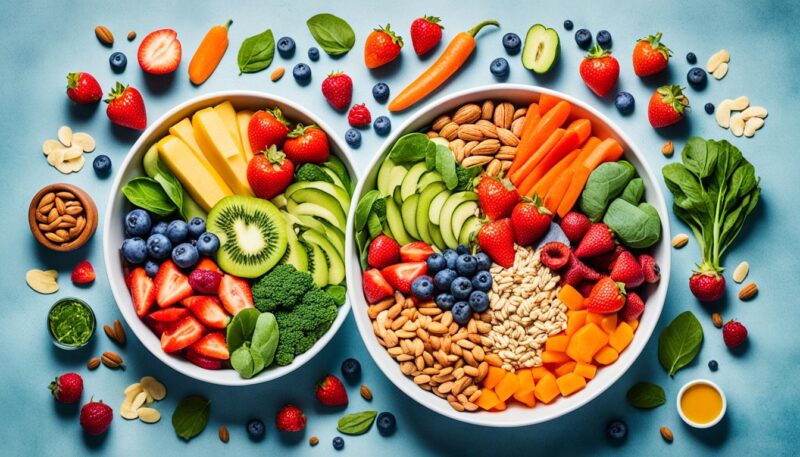I know how tough it can be to live with PCOS. It affects not only our body but also our mind. Hormonal changes, weight struggles, and feeling down can be tough to deal with. They can make us feel alone.
But, many of us face these challenges. Thousands of people are in this fight every day. There’s no magic fix, but we can do things to feel better and stronger together.
I’m here to share tips that work for me and are backed by science. Changing your PCOS diet can help a lot. It can ease symptoms and boost mood. The food we eat affects not just our body but also our mind. So, let’s dig into the power of good nutrition for our mental health.
Key Takeaways:
- Adopting a tailored PCOS diet can have a positive impact on mood and overall mental wellness.
- There is a link between PCOS and an increased risk of depression.
- A healthy and balanced diet can help improve mood and overall mental well-being in individuals with PCOS.
- Reducing carbohydrate intake, increasing fiber consumption, and incorporating healthy fats into the diet are key dietary recommendations for managing PCOS and depression.
- Weight loss can lead to improvements in mental health and overall quality of life for individuals with PCOS.
Understanding the Link Between PCOS and Depression
Studies show a strong connection between PCOS and a higher risk of depression. This link is because PCOS causes hormonal issues and insulin resistance. These issues make it more likely for women with PCOS to feel depression and anxiety.
Research has found that depression might last a long time in women with PCOS. That’s why it’s important to treat both the physical and mental symptoms of PCOS. A diet focused on PCOS can help a lot in managing your mood and mental health.
Many studies highlight the benefits of eating for PCOS to feel better emotionally. By eating foods that are good for you and following a specific diet, you can reduce symptoms and feel better overall. This shows taking care of both the body and mind helps fight PCOS.
Impact of Hormonal Imbalances and Insulin Resistance
PCOS often results in too much of certain hormones, like testosterone. These imbalances can affect brain chemicals that control mood. This can make depression more likely.
Insulin resistance, a common issue in PCOS, isn’t good for mental health either. It messes with how your body uses sugar and your mood can swing. These effects can make depression worse.
Research shows hormonal imbalances and insulin resistance are key in PCOS-related depression.
https://www.youtube.com/watch?v=oGPtQSb30W8
The Importance of Addressing Mental Health
Thinking about mental health in PCOS is vital for looking and feeling good. Depression from PCOS can ruin your day-to-day life. It may also make it harder to stick to healthy habits.
Following a diet that helps your mood and keeps hormones stable is a smart move. It’s part of a holistic way to manage PCOS. This method supports other treatments and takes care of both the body and mind.
Caring for your mind and mood is as important as treating your body in PCOS. When you focus on mental well-being, you can live a better life and feel truly well.
The Impact of Diet on Mental Health in PCOS
Studies show that what we eat really matters for our mental health. For those with PCOS, choosing a healthy diet is key to feeling better overall.
There are special kinds of food that can boost your mood when you’re dealing with PCOS. For instance, meals with omega-3 fatty acids, like salmon, can help fight off sadness. Foods with vitamin D, such as fortified dairy, also lift your spirits.

Foods rich in magnesium, including leafy greens and nuts, are linked to less depression risk. Eating these along with a holistic PCOS and depression plan can make a big difference.
Focusing on wholesome, nutrient-packed meals sets the stage for a healthy body and mind. A diet designed for your PCOS needs can work with other treatments. This helps you take a complete approach to fighting depression and boosting your mental well-being.
Key Dietary Recommendations for PCOS and Depression
Managing depression in people with PCOS includes key dietary steps. Nutritional strategies for PCOS and mood disorders aid in hormone level stability. They also help control blood sugar and support gut health, improving mental health.
Reducing Carbohydrate Intake
Firstly, cutting back on carbs helps with insulin levels. This is big for balancing moods and keeping energy steady. Eating complex carbs, like whole grains and veggies, helps control blood sugar. This cuts the chance of feeling blue.
Increasing Fiber Consumption
Next, add more fiber to your meals. Enough fiber means feeling full longer and stable blood sugar. It also helps your gut work right. Fruits, veggies, and whole grains are great for this. Seeds work well too.
Ensuring Adequate Protein Intake
Getting enough protein is vital for someone with PCOS and depression. Protein foods help make chemicals that affect mood, like serotonin. Choose from lean meats, eggs, tofu, and more for your meals.
Incorporating Healthy Fats
Don’t forget healthy fats for feeling full and managing weight. These fats are tied to better mood and brain health. Avocados, nuts, and fish with omega-3 are excellent choices.
Consuming Fermented Foods
Eating fermented foods is good for your gut, which affects how you feel. Foods like yogurt and kimchi are full of good bacteria. They may boost your mood and lower depression risk.
Also, stay away from processed foods and too much sugar. Exercise, enough sleep, and stress control are important too. Following these dietary guidelines plus a holistic PCOS plan can uplift mental well-being and life quality.
The Role of Weight Loss in Improving Mental Health in PCOS
Losing weight is key to managing PCOS and feeling better mentally. A 5% weight drop can do wonders. It helps with issues like insulin resistance, hormone balance, and mood.
Switching to a healthier diet can be a big help. Eating the right foods can aid weight loss and boost mental well-being. Focus on a diet filled with fruits, veggies, grains, lean meats, and good fats.
Exercising regularly is also vital. Aim for 150 minutes of moderate activity or 75 minutes of intense exercise each week. This can help you lose weight and feel better mentally.
But, shedding pounds doesn’t happen fast. It takes sticking to a plan and being patient. Set achievable goals and change your habits slowly. Remember to cheer small wins and get help if you need it.
By focusing on diet and exercise, people with PCOS can feel more in control. They can lessen symptoms and boost their mental health, leading to a happier life.

For more information about PCOS, check out the World Health Organization’s fact sheet on Polycystic Ovary Syndrome.
Additional Lifestyle Considerations for Managing PCOS and Depression
Besides changing your diet, other lifestyle choices can help ease PCOS symptoms and boost your mood. It’s important to look at both the body and mind parts of PCOS. This way, you can feel better overall and be happier.
Regular Exercise
For those with PCOS and depression, being active is key. Exercise helps lower depression and anxiety. It releases endorphins, improving your mood naturally. It also cuts stress and makes sleep better. Mix aerobic, strength, and flexibility exercises for the best results.
Sufficient Sleep
Good sleep is very important, especially if you have PCOS and depression. Try to get 7-9 hours a night. This supports hormone balance, mood, and thinking clearly. Have a bedtime routine, a cozy sleep space, and avoid caffeine and screens before bed. Doing relaxing things before sleep helps too.

Stress Management Techniques
Reducing stress is a must for PCOS and depression. Stress makes symptoms worse and can harm your mental health. Try things like yoga, meditation, or taking deep breaths. These can cut anxiety and make you feel calmer. Pick what works for you and do it every day.
Incorporating Enjoyable Activities
Doing fun things is vital for your mental health and happiness. Find time for hobbies, creative work, or just being with friends. Enjoyable activities can lower stress and lift your spirits. They also add meaning to your life.
Exercise, good sleep, stress management, and fun activities help manage your PCOS and boost mood. And, with a healthy PCOS diet, they can make a big difference to your whole well-being.
For more information on PCOS, check out the World Health Organization’s Fact Sheet on Polycystic Ovary Syndrome.
The Importance of Seeking Professional Guidance
Changing your diet and lifestyle can help with PCOS and depression. Yet, getting expert advice for PCOS and depression is key. Experts like dietitians can offer guidance for PCOS nutrition. They’ll make a plan just for you, meeting your needs and goals.
These pros know what you need to eat based on your health and goals. They’ll make a plan to keep you healthy. Experts can give you tips, support, and the right info to deal with PCOS and feel better mentally.
They know about PCOS diet, insulin, and foods that can boost your mood. With their help, you’ll learn a lot and be able to choose better foods.
Getting professional help means you don’t have to figure everything out yourself. They offer advice that fits you perfectly. They check in on you, make changes as needed, and help you stick to your health goals.
Dealing with PCOS and depression is hard but you don’t have to do it alone. Get help from pros to make a diet plan just for you. This can improve your health and well-being.

Complementary Therapies and Support for PCOS and Depression
Besides changing your diet and lifestyle, there are other ways to help with PCOS and depression. These include complementary therapies and support. They work well alongside a holistic approach. They offer extra ways to handle depressive symptoms and boost well-being.
Cognitive-Behavioral Therapy (CBT)
CBT is a well-known therapy that tackles negative thoughts and behaviors. It’s great for individuals with PCOS and depression. It helps people find healthier ways to cope, boosts self-esteem, and cuts down on anxiety and depression symptoms.
Acupuncture
Acupuncture is from China and uses thin needles on certain parts of the body. It’s said to balance the body’s energy, Qi. Studies have shown it helps with mental health, easing depression and anxiety. It can also lower pain and better well-being.
Mindfulness Stress Management Programs
There are programs like MBSR and MBCT that use mindfulness to ease stress. These teach people to stay in the moment, know themselves better, and manage stress. They lessen depression and improve mental health.
Motivational Interviewing
Motivational interviewing helps increase motivation and change behavior. It’s good for those with PCOS and depression. It helps them get ready for and make positive lifestyle changes. This can lead to better mental health.
Always talk with healthcare professionals about using complementary therapies. They will help find the best ones for you. These therapies are meant to support your main treatment and help with PCOS and depression.

Conclusion
Dealing with both PCOS and depression is complex. It’s a mix of physical and mental care. A diet designed for PCOS, plus lifestyle tweaks and proper medical advice, can really help. This approach improves mood and boosts overall happiness for those with PCOS.
It’s crucial to work closely with health experts. They can help tailor a plan that fits the unique needs of each person. Nutrition experts, like dietitians, are key. They offer personal advice and support. This guidance empowers people with PCOS to better manage their symptoms and mental health.
Focusing on a PCOS-friendly diet is just one step. It should be part of a larger strategy. This strategy strives to care for both body and mind. By focusing on good nutrition and lifestyle changes, those with PCOS can feel more in control. This move towards a healthier, happier life.














